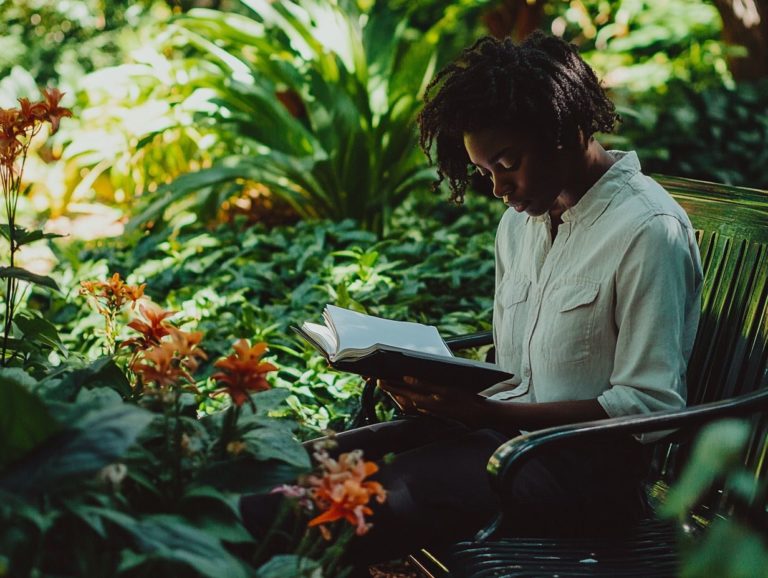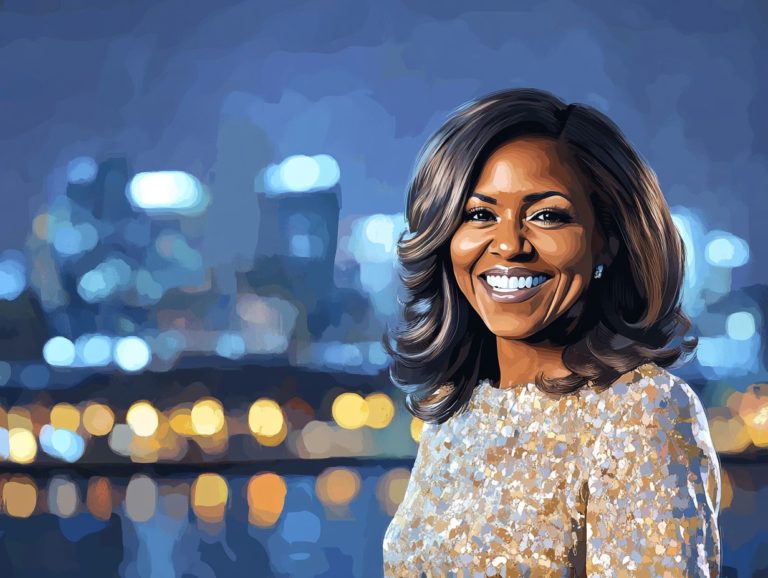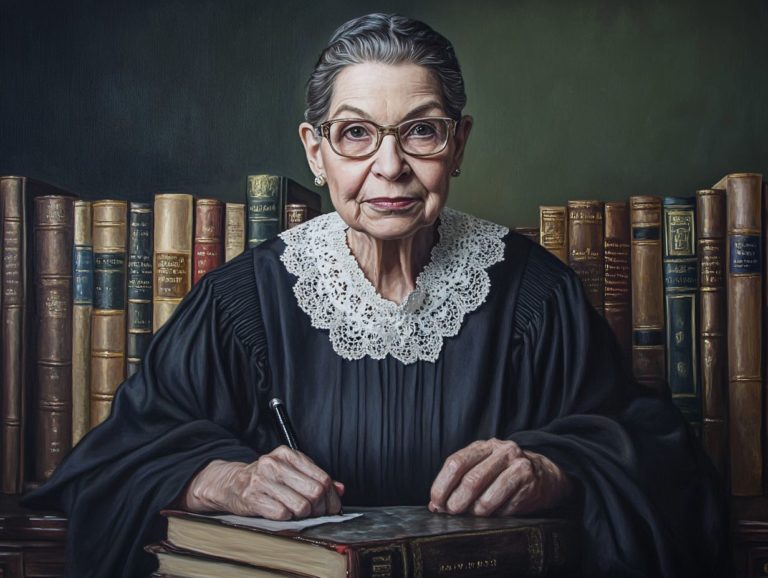5 Influential Figures in the Fight for Equality
Throughout history, certain individuals have emerged as powerful symbols in the ongoing struggle for equality. From Martin Luther King Jr.’s dream of justice to Malala Yousafzai’s tireless fight for fair treatment, these remarkable figures have confronted immense challenges while inspiring generations.
Join us as we dive into the stories of five incredible figures King, Yousafzai, Nelson Mandela, Gloria Steinem, and Ruth Bader Ginsburg. You’ll discover their contributions, the obstacles they overcame, and the lasting impact of their actions.
Don t miss out on this journey as we uncover the invaluable lessons their legacies impart to us today.
Contents
- Key Takeaways:
- 1. Martin Luther King Jr.
- 2. Malala Yousafzai
- 3. Nelson Mandela
- 4. Gloria Steinem
- 5. Ruth Bader Ginsburg
- How Have These Figures Contributed to the Fight for Equality?
- Frequently Asked Questions
- Who are considered the 5 influential figures in the fight for equality?
- What contributions did Martin Luther King Jr. make in the fight for equality?
- How did Rosa Parks impact the fight for equality?
- What role did Mahatma Gandhi play in the fight for equality?
- How did Nelson Mandela fight for equality?
- What impact did Malala Yousafzai have on the fight for equality?
- Conclusion
Key Takeaways:
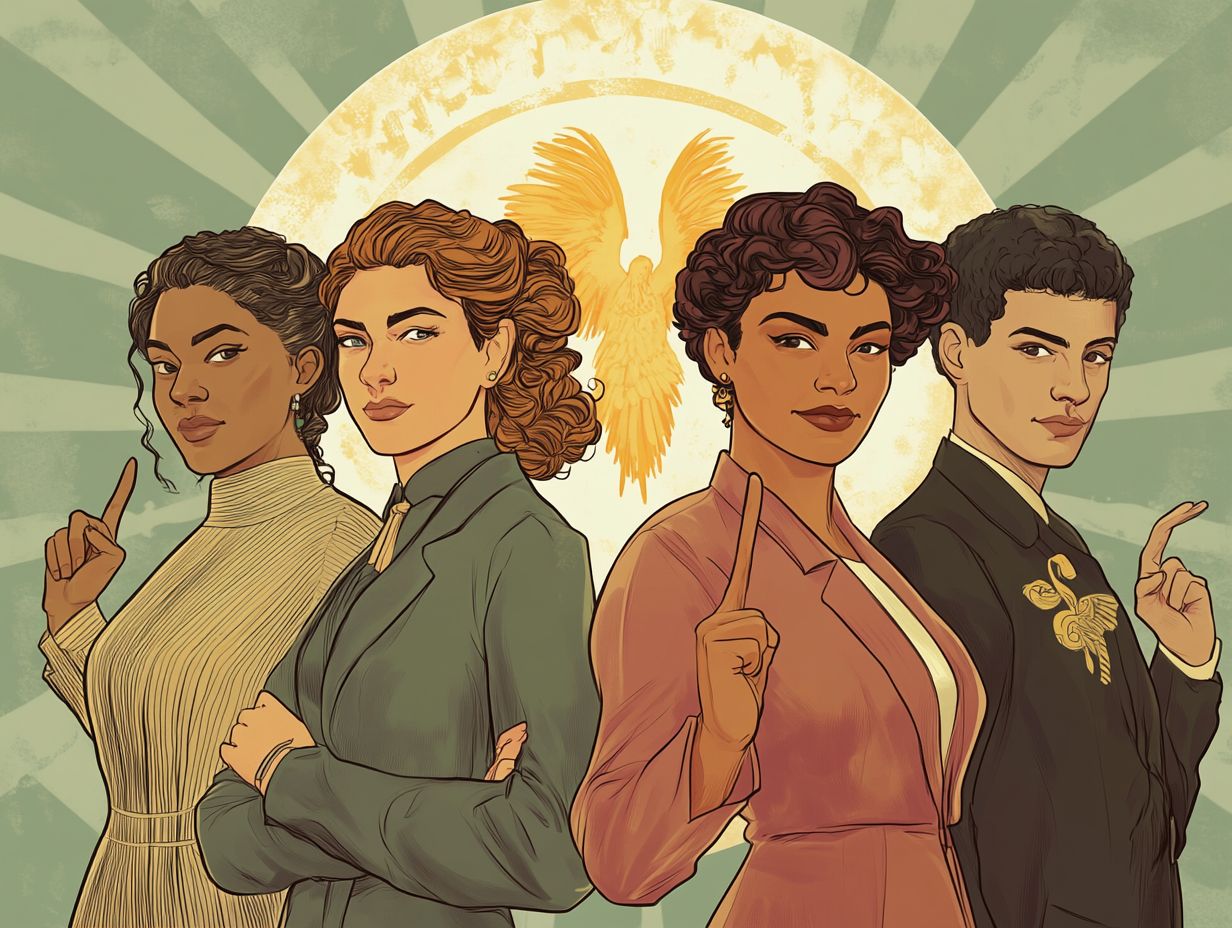
- Martin Luther King Jr., Malala Yousafzai, Nelson Mandela, Gloria Steinem, and Ruth Bader Ginsburg all made significant contributions to the fight for equality.
- These figures faced numerous obstacles in their activism, including violence and discrimination.
- Their impact on society is seen through legal and social changes that improved the lives of marginalized groups.
- Their actions inspired others to join the fight for equality and continue their legacy.
- These influential figures teach us the power of perseverance and the importance of standing up for what is right.
1. Martin Luther King Jr.
Martin Luther King Jr. is a pivotal figure in the civil rights movement, fighting for social justice and equal rights for Black Americans during a tumultuous period in the United States. His unwavering commitment to nonviolent protests and civil disobedience energized a generation and paved the way for landmark legislation, such as the Civil Rights Act, fundamentally transforming American society.
Born in Atlanta in 1929, King grew up in a relatively privileged environment that was keenly attuned to the nuances of racial injustice. By the 1950s, he emerged as a leader, orchestrating the Montgomery Bus Boycott in response to Rosa Parks’ courageous refusal to give up her seat. This defining protest exemplified the extraordinary strength of collective action.
His collaborations with influential figures like John Lewis further magnified the movement s impact, culminating in the iconic March on Washington in 1963. During this historic event, King’s eloquence resonated with the ideals of equality and voting rights, inspiring countless individuals to join the relentless fight for civil rights.
2. Malala Yousafzai
Malala Yousafzai stands as a global icon for education and social justice, embodying unwavering advocacy for girls’ rights amid extreme adversity and violence.
She was born in Pakistan’s Swat Valley, a region steeped in conflict where access to education, particularly for girls, was severely restricted. From a young age, her courageous activism took root as she expressed her desire for education through a blog under a pseudonym. This act of defiance came at a devastating cost; in 2012, she survived a horrific attack by the Taliban, an experience that only strengthened her resolve.
After her recovery, she co-founded the Malala Fund, a remarkable initiative dedicated to enabling young girls through education. Today, her story echoes around the globe, igniting youth activism and inspiring countless individuals to champion the fundamental right to education.
Her journey beautifully illustrates the power of resilience in the face of oppression, reminding us that one voice can spark monumental change.
3. Nelson Mandela
Nelson Mandela is a towering figure in the fight for equality and social justice. He led the anti-apartheid movement in South Africa, becoming a beacon of resilience and hope for oppressed communities worldwide.
His journey was marked by decades of struggle. It began with his activism against the oppressive apartheid regime that enforced racial segregation and discrimination.
Mandela s 27 years of imprisonment symbolize a relentless fight for freedom. They drew international attention to the injustices his people faced.
Upon his release, he focused on reconciliation rather than revenge. His commitment aimed to heal the divides within a fractured nation.
His leadership dismantled apartheid, transforming South Africa and inspiring social justice movements around the globe. It highlighted the importance of forgiveness, dialogue, and unity in the ongoing quest for equality.
4. Gloria Steinem
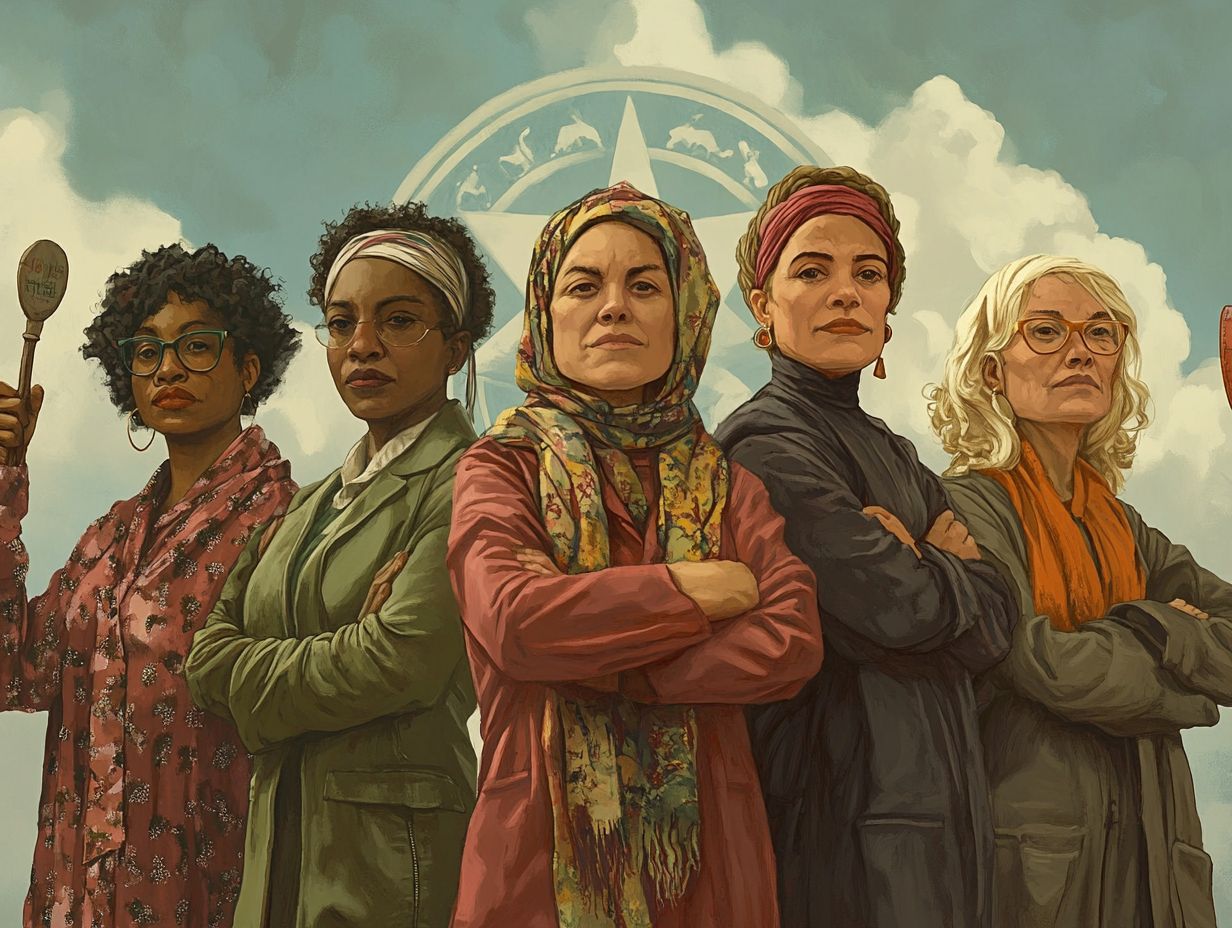
Gloria Steinem is a distinguished feminist icon and social justice advocate. She is celebrated for her efforts in promoting women’s rights and gender equality throughout the latter half of the 20th century.
As a co-founder of Ms. Magazine in 1972, she created a platform for women s voices. This enriched the conversation around feminism significantly.
Through her activism, Steinem became a cornerstone of the women s liberation movement. She vigorously championed reproductive rights, workplace equality, and initiatives that highlighted diverse women’s experiences.
Her influence resonates in contemporary feminism. Today, discussions about intersectionality are essential to social justice movements.
Steinem has fostered a more inclusive understanding of feminism that embraces race, class, and sexual orientation. This commitment solidifies her role in reshaping societal attitudes toward gender equality.
5. Ruth Bader Ginsburg
Ruth Bader Ginsburg carved her name in history as a trailblazer for gender equality. She was a powerful advocate for social justice during her time on the United States Supreme Court.
Her journey began in Brooklyn, New York. She navigated the challenges of a male-dominated educational system alongside societal expectations.
Ginsburg s commitment to women’s legal rights was evident in her work with the American Civil Liberties Union. There, she co-founded the Women’s Rights Project.
As an attorney, she led groundbreaking cases like Reed v. Reed and Frontiero v. Richardson. These cases dismantled discriminatory laws against women.
Her legacy continues to resonate today. Her decisions have shaped civil rights and ensured that the pursuit of gender equality remains vital in American jurisprudence.
How Have These Figures Contributed to the Fight for Equality?
Figures like Martin Luther King Jr., Malala Yousafzai, Nelson Mandela, Gloria Steinem, and Ruth Bader Ginsburg have profoundly shaped the fight for equality. Their legacies inspire movements that advocate for equitable treatment for all.
Each individual brought unique perspectives to the struggle. King championed nonviolent resistance, while Yousafzai used her voice to advocate for educational rights, especially for girls in Pakistan.
Mandela s imprisonment highlighted resilience in combatting apartheid. Ginsburg s legal battles advanced women s rights through the judicial system.
Steinem expanded the conversation around gender equality, linking it to various social movements. These diverse methods highlight the complexity of fighting for justice.
They also impart valuable lessons about adaptability, intersectionality, and solidarity in our ongoing struggles against inequality.
What Obstacles Did They Face in Their Activism?
Each of these influential figures encountered numerous obstacles in their activism, including societal backlash, legal challenges, personal threats, and systemic resistance. This illustrates the challenging path toward achieving social justice and equality.
The historical context surrounding their efforts heightened these challenges. They navigated a landscape where societal norms were vehemently opposed to change. For instance, during times of intense racial segregation and discrimination, their commitment to civil rights advocacy placed them at considerable personal risk.
This reality required them to develop sophisticated strategies to bring people together and gain support.
Legal barriers forced them to become adept at mobilizing communities and leveraging media coverage to amplify their messages. In doing so, they turned the opposition they faced into opportunities for broader engagement and advocacy.
What Impact Have They Had on Society?
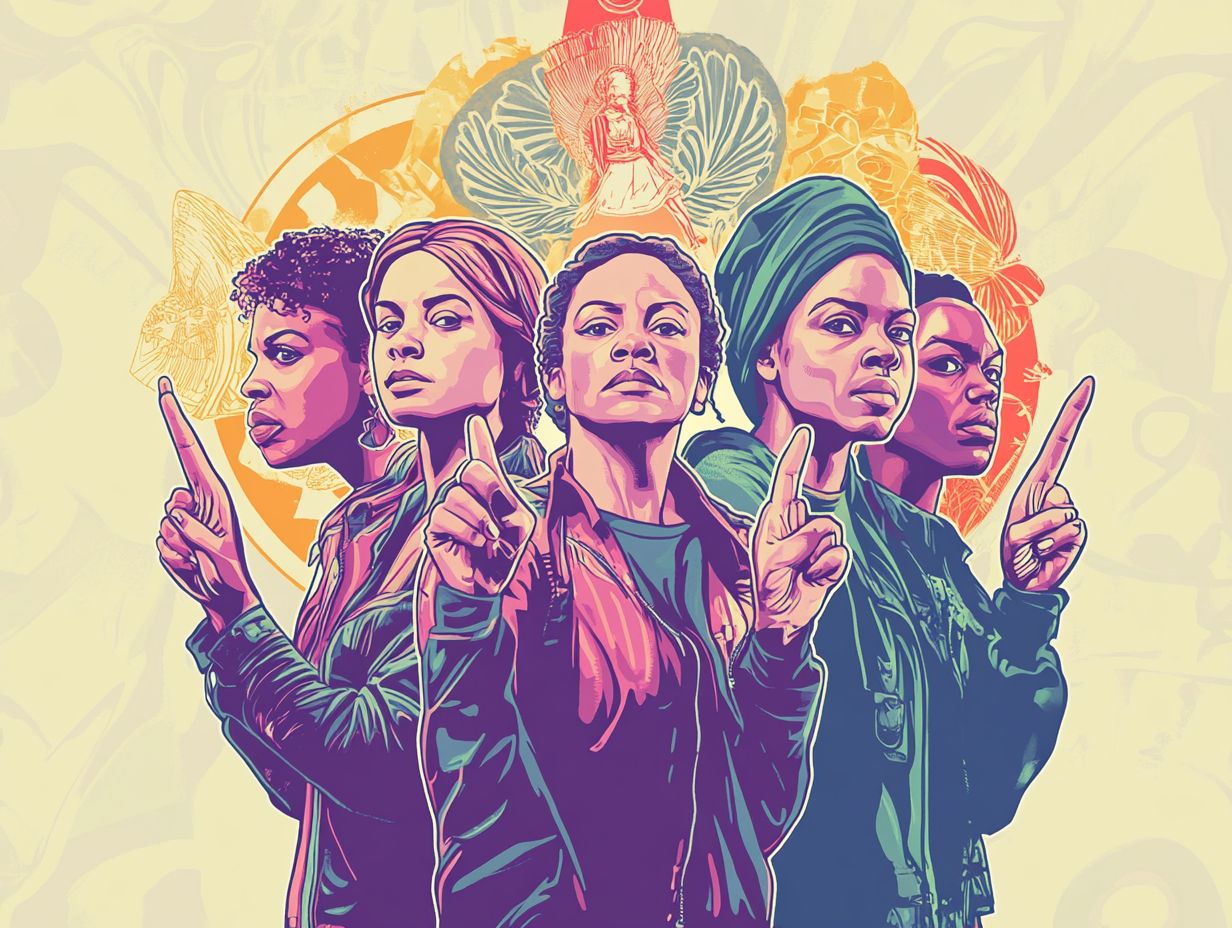
These figures profoundly shaped our society. Their efforts led to significant advances in equality and justice, influencing laws and inspiring future activists.
Consider the civil rights movement, which paved the way for monumental laws like the Civil Rights Act of 1964 and the Voting Rights Act of 1965. These laws dismantled institutional racism and expanded access to the ballot for countless individuals. As grassroots campaigns and peaceful protests highlighted the injustices faced by marginalized communities, public opinion began to shift, fostering empathy and support among broader demographics.
Moreover, the principles championed by these early activists inspired later movements, such as the LGBTQ+ rights movement and environmental advocacy. Their courage serves as a powerful reminder of the impact of collective action and the importance of standing against injustice in the pursuit of a more equitable society.
How Have Their Actions Inspired Others to Join the Fight for Equality?
The actions of Martin Luther King Jr., Malala Yousafzai, Nelson Mandela, Gloria Steinem, and Ruth Bader Ginsburg inspire you and countless others to join the fight for equality, proving that one voice can ignite widespread change.
Their compelling narratives and unwavering commitment to justice have sparked grassroots movements, with communities rallying to advocate for the rights of marginalized groups. For instance, King s legacy has inspired the modern Black Lives Matter movement, urging activists like you to confront systemic racism and police brutality directly.
Similarly, Yousafzai’s courageous stance on education for girls has led to local campaigns that empower young women to chase their dreams, often resulting in innovative educational initiatives led by motivated local leaders.
Each of these influential figures has not only spotlighted important causes but also mobilized a new generation of activists like you united in the pursuit of a more just and equitable society.
What Lessons Can We Learn from These Influential Figures?
The legacies of these influential figures offer invaluable lessons for you as a current or future activist. They emphasize the importance of perseverance, strategic thinking, and the necessity of solidarity in your pursuit of social justice and equality.
Reflecting on their journeys provides insights into how these trailblazers navigated complex challenges and harnessed collective power to effect change. Their examples urge you to adapt your tactics to today s landscape while remaining steadfast in your commitment to justice.
In an era marked by polarization and division, these lessons on unity and resilience are crucial. Understanding the historical context of their struggles can illuminate pathways for effective engagement and coalition-building, making their experiences not only relevant but essential for fostering a lasting impact in today s socio-political climate.
Frequently Asked Questions
Who are considered the 5 influential figures in the fight for equality?
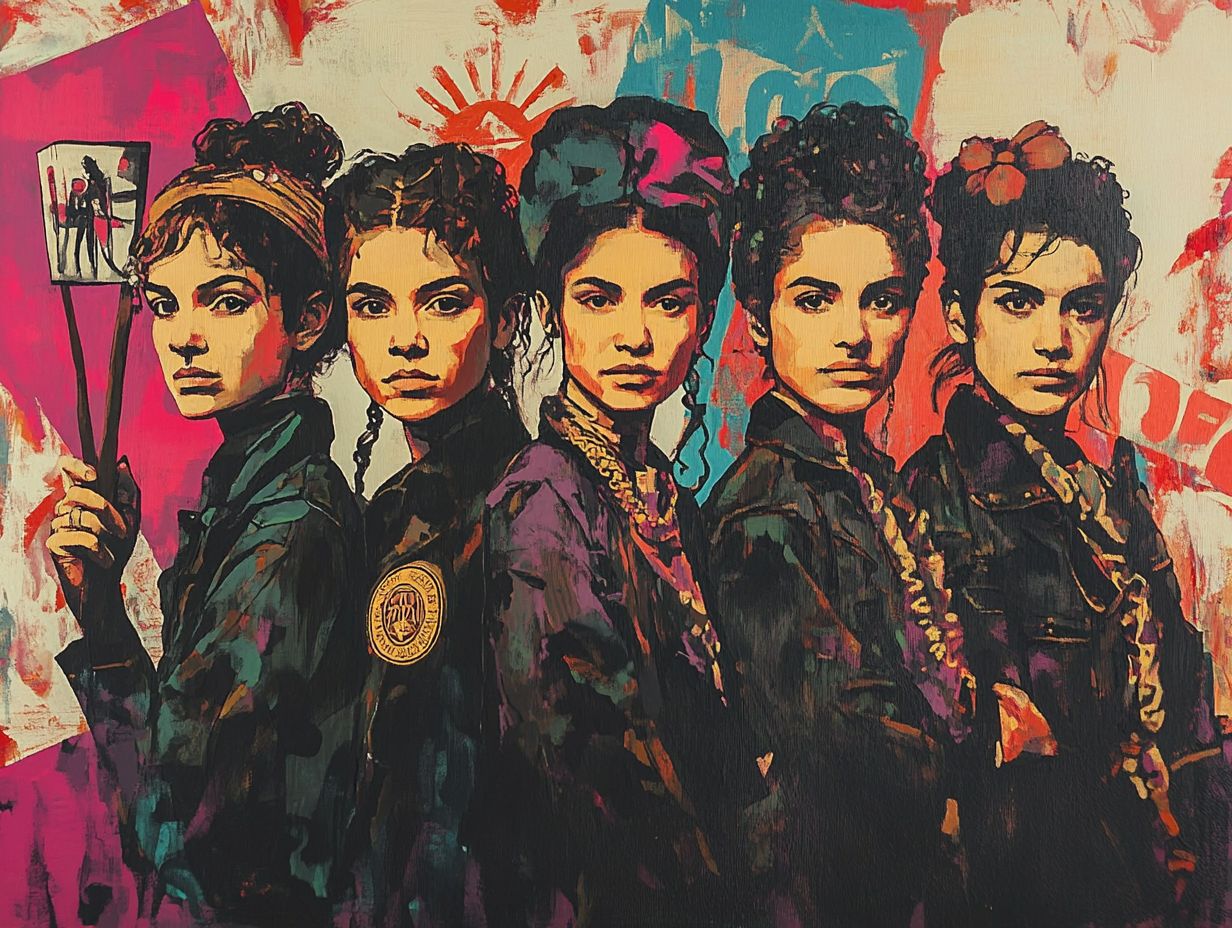
Here are five influential figures who fought for equality: Martin Luther King Jr., Rosa Parks, Mahatma Gandhi, Nelson Mandela, and Malala Yousafzai.
What contributions did Martin Luther King Jr. make in the fight for equality?
Martin Luther King Jr. was a prominent leader in the Civil Rights Movement, which aimed to end racial discrimination. He used nonviolent activism to advocate for racial equality in the United States.
How did Rosa Parks impact the fight for equality?
Rosa Parks, often called the “mother of the Civil Rights Movement,” made history with her brave stand on a segregated bus. Her act of defiance sparked the Montgomery Bus Boycott and raised awareness about racial segregation in the United States.
What role did Mahatma Gandhi play in the fight for equality?
Mahatma Gandhi was a key figure in the Indian independence movement. He advocated for nonviolent resistance against British colonial rule and worked tirelessly to promote equality and social justice in India.
How did Nelson Mandela fight for equality?
Nelson Mandela was a South African anti-apartheid revolutionary and politician. He spent 27 years in prison for his activism and, after his release, continued to fight for racial equality, becoming the first black president of South Africa.
What impact did Malala Yousafzai have on the fight for equality?
Malala Yousafzai is a Pakistani activist for female education and the youngest Nobel Peace Prize laureate. She has used her platform to advocate for girls’ education and has become a symbol of the fight for gender equality.
Conclusion
The legacies of these influential figures remind us that the fight for equality continues. Their contributions inspire us to take action and strive for a more just world.

